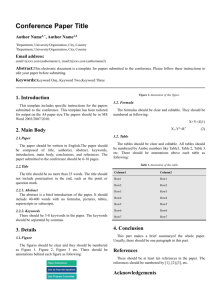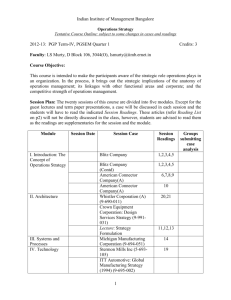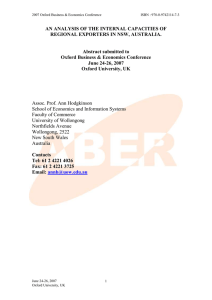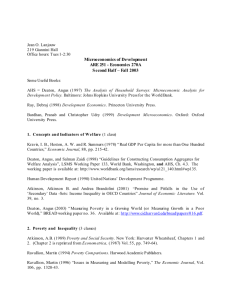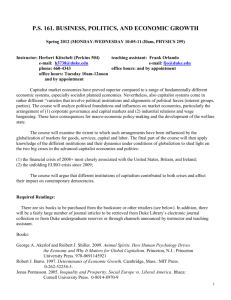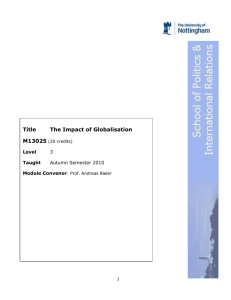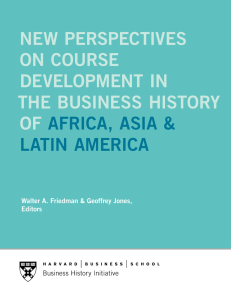Economics and Management reading list
advertisement
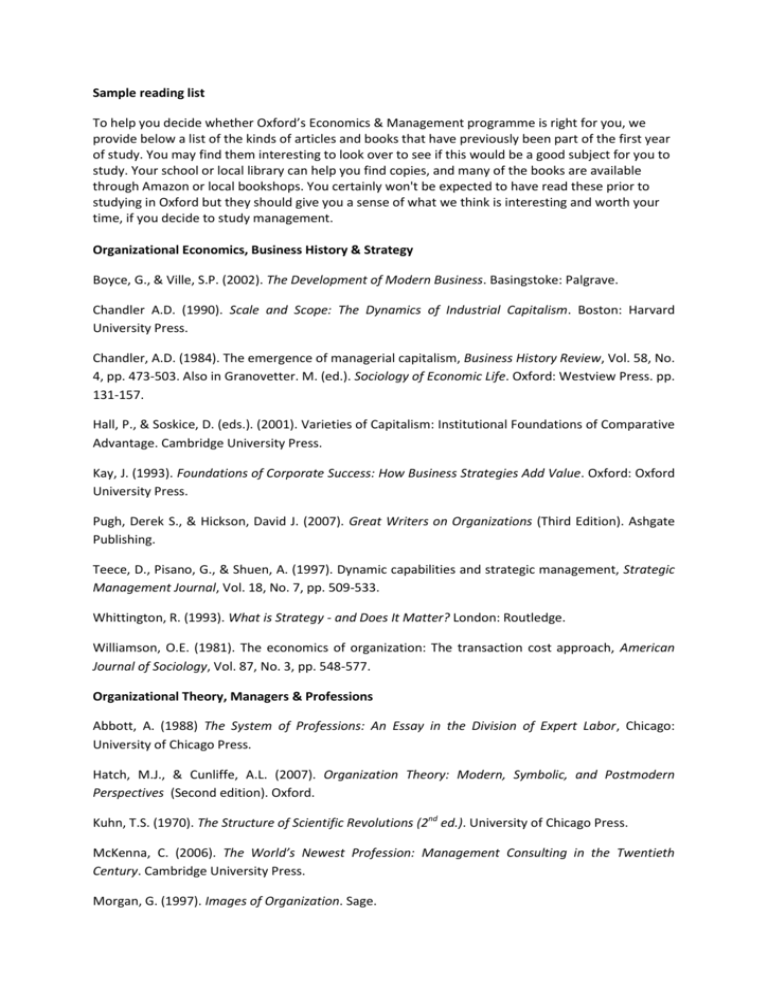
Sample reading list To help you decide whether Oxford’s Economics & Management programme is right for you, we provide below a list of the kinds of articles and books that have previously been part of the first year of study. You may find them interesting to look over to see if this would be a good subject for you to study. Your school or local library can help you find copies, and many of the books are available through Amazon or local bookshops. You certainly won't be expected to have read these prior to studying in Oxford but they should give you a sense of what we think is interesting and worth your time, if you decide to study management. Organizational Economics, Business History & Strategy Boyce, G., & Ville, S.P. (2002). The Development of Modern Business. Basingstoke: Palgrave. Chandler A.D. (1990). Scale and Scope: The Dynamics of Industrial Capitalism. Boston: Harvard University Press. Chandler, A.D. (1984). The emergence of managerial capitalism, Business History Review, Vol. 58, No. 4, pp. 473-503. Also in Granovetter. M. (ed.). Sociology of Economic Life. Oxford: Westview Press. pp. 131-157. Hall, P., & Soskice, D. (eds.). (2001). Varieties of Capitalism: Institutional Foundations of Comparative Advantage. Cambridge University Press. Kay, J. (1993). Foundations of Corporate Success: How Business Strategies Add Value. Oxford: Oxford University Press. Pugh, Derek S., & Hickson, David J. (2007). Great Writers on Organizations (Third Edition). Ashgate Publishing. Teece, D., Pisano, G., & Shuen, A. (1997). Dynamic capabilities and strategic management, Strategic Management Journal, Vol. 18, No. 7, pp. 509-533. Whittington, R. (1993). What is Strategy - and Does It Matter? London: Routledge. Williamson, O.E. (1981). The economics of organization: The transaction cost approach, American Journal of Sociology, Vol. 87, No. 3, pp. 548-577. Organizational Theory, Managers & Professions Abbott, A. (1988) The System of Professions: An Essay in the Division of Expert Labor, Chicago: University of Chicago Press. Hatch, M.J., & Cunliffe, A.L. (2007). Organization Theory: Modern, Symbolic, and Postmodern Perspectives (Second edition). Oxford. Kuhn, T.S. (1970). The Structure of Scientific Revolutions (2nd ed.). University of Chicago Press. McKenna, C. (2006). The World’s Newest Profession: Management Consulting in the Twentieth Century. Cambridge University Press. Morgan, G. (1997). Images of Organization. Sage. Scott, W.R. (2002). Organisations: Rational, Formal, and Open Systems Perspectives (Fifth edition). Prentice Hall. Shafritz, Jay M., Ott, J. Stephen, & Jang, Yong Suk. (2010). Classics of Organisation Theory, Seventh Edition. Wadsworth. Management, Innovation & International Business Barney, J.B. (1986). Organizational culture: Can it be a source of sustained competitive advantage?, Academy of Management Review, Vol. 11, No. 3, pp. 656-665 Baron, David P. 2010. Business and its Environment. (Sixth edition). Pearson. Bijker, W.E. (1995). Of Bicycles, Bakelites, and Bulbs: Toward a Theory of Sociotechnical Change. Cambridge MA: MIT Press. Christensen, C. (1997). The Innovator’s Dilemma: When New Technologies Cause Great Firms To Fail. Boston, MA: Harvard Business School Press. Cusumano, M.A., Mylonadis, Y., & Rosenbloom, R.S. (1992). Strategic manoeuvring and mass-market dynamics: the Triumph of VHS over Beta, Business History Review, Vol. 66, No. 1, pp. 51-94. Geroski. P.A. (2003.) The Evolution of New Markets. Oxford: Oxford University Press. Goleman, D. (1998). What makes a leader?, Harvard Business Review, Nov/Dec, Vol. 76, No. 6, pp. 93-102. Hargadon, A.B., & Douglas, Y. (2001). When innovation meets institutions: Edison and the design of the electric light, Administrative Science Quarterly, Vol. 46, No. 3, pp. 476-501. Lukes, S. (1974). Power: A Radical View. Macmillan. Pfeffer, J. (1981). Power in Organizations. Harper Business. Utterback, J.M. (1994). Mastering the Dynamics of Innovation: How Companies Can Seize Opportunities in the Face of Technological Change. Boston MA: Harvard Business School Press. Marketing, Operations and Supply Chains Brown, S, Blackmon, K, Maylor, H, & Cousins, P. 2001. Operations Management: Policies, Practices and Performance. Butterworth-Heinemann. Helper, S., & Sako, M. (1995). Supplier relations in Japan and the United States, Sloan Management Review, Spring Kotler, P., Armstrong. G., Wong, V., & Saunders, J. (2008). Principles of Marketing, Fifth European Edition. FT Prentice Hall. Levitt, T. (1975). Marketing myopia and a retrospective commentary, Harvard Business Review, Vol. 53, No. 5, pp. 26-44 and 173-181. Slack, N., Chambers, S., & Johnston, R. (2004). Operations Management, 4th ed. Harlow Essex: FT Prentice Hall. Williamson, Oliver E. (2008). Outsourcing: Transaction cost economics and supply chain management, Journal of Supply Chain Management, Vol. 44, No. 2, pages 5–16. Womack, J.P., Jones, D.T., &Roos, D. (1990). The Machine That Changed the World. June 2013






